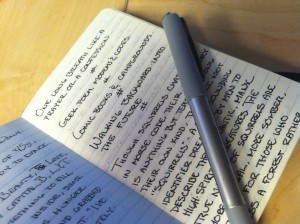
Trying to write as a dozen conversations circle around me is maddening at times. Other times it’s pure gold.
I’m one of those people who prefers to write in complete silence or maybe with some quiet music (sans lyrics), but the pressures of my day job don’t afford me that opportunity very often. Instead, I find myself putting words on a page as the room roars with impromptu meetings, phone conversations, and smack-talk over an occasional game of foosball.
But let’s be honest, listening is what writers are supposed to be doing. If we’re not listening to the world around us, we’re robbing ourselves — and our writing — of one-fifth of our sensory input. How else can we write genuine-sounding dialogue if we don’t pay attention to how people talk?
Before I married, I spent a lot of time alone in public places: coffeehouses, restaurants, theaters. Everywhere I went, I took a Moleskine notebook with me — just in case. I ended up with a great collection of random thoughts, observations, and overheard quotes. But it came with a price.
Writing something down the moment that you hear it cements it. Makes it permanent. Sure, a notebook is great for remembering things you might forget, but it becomes a mere archive if you forget to go back to it. And sometimes, a great idea needs to rattle around in the brain before being committed to paper. This isn’t journalism. You’re allowed to stretch a bit of overheard dialogue to fit your story.
Looking through my Moleskine, I see a lot of unused bits and pieces. Some are potential titles, some are story concepts, others are inane ramblings. But few — very few — of these bits are quotes that have ended up in my writing.
Keep a notebook handy to capture moments of inspiration and inspired dialogue. But don’t forget to revisit it now and then when you’re looking for inspiration.
It’s not enough to write down the bits of conversation you hear. Like a prospector panning in a river, you need to sift through it repeatedly to find the gold.
Leave a Reply